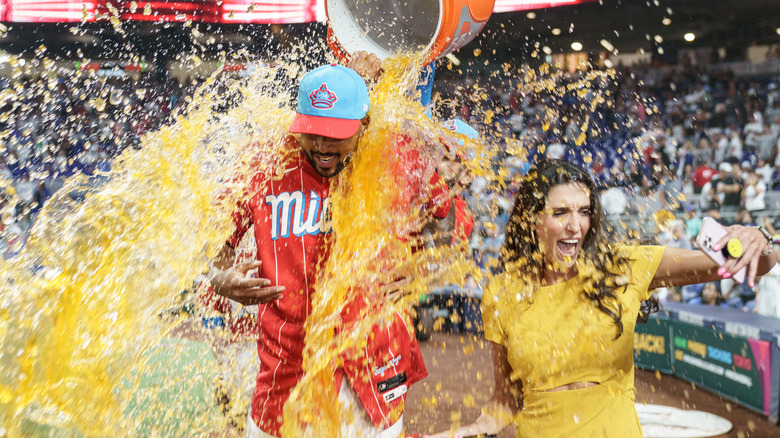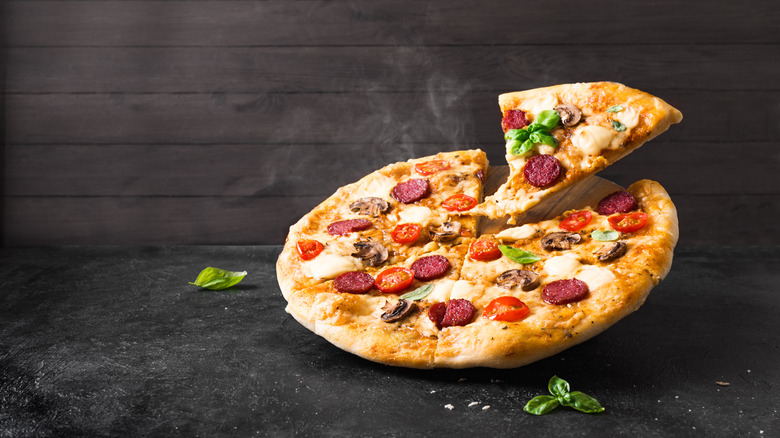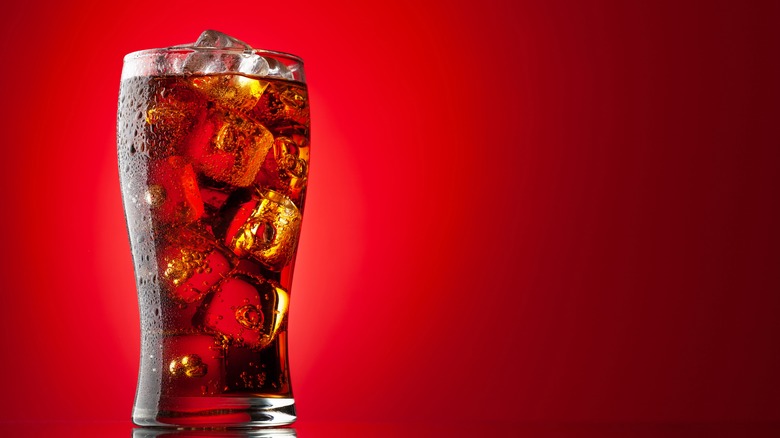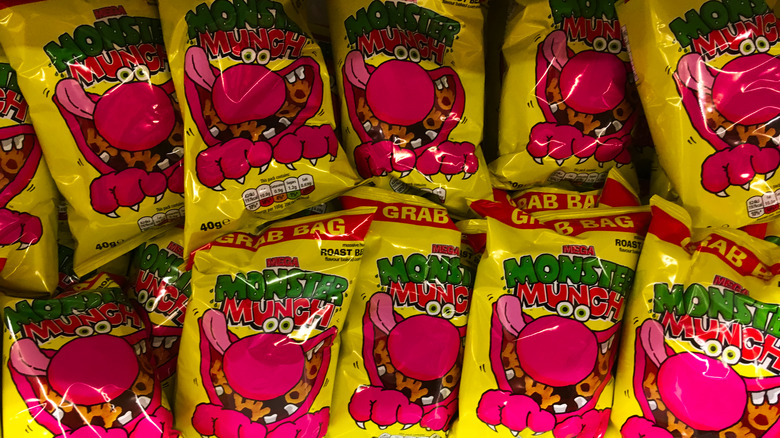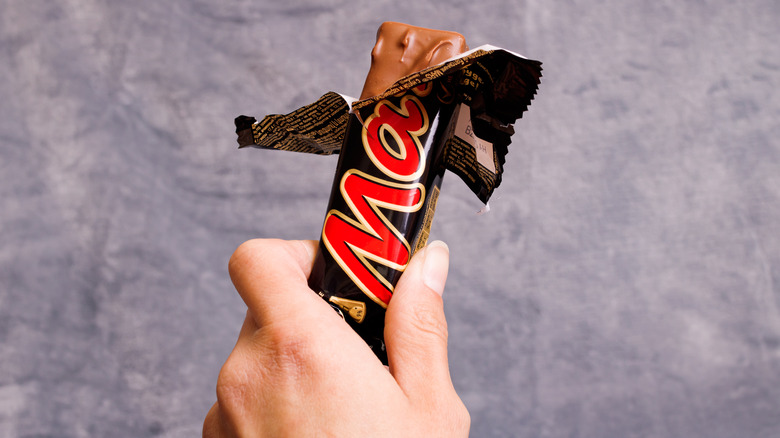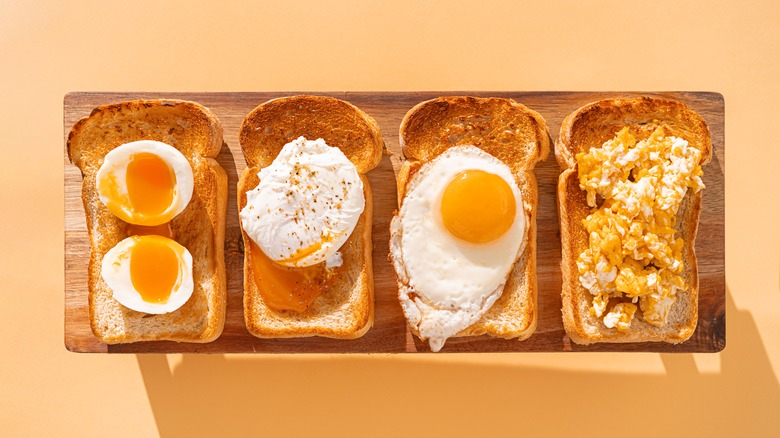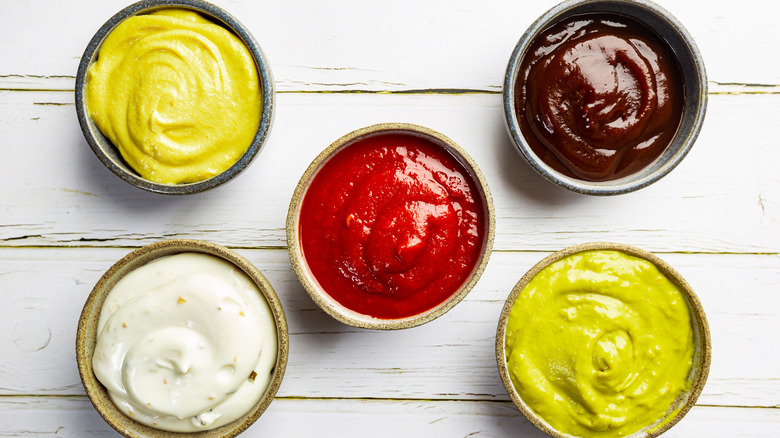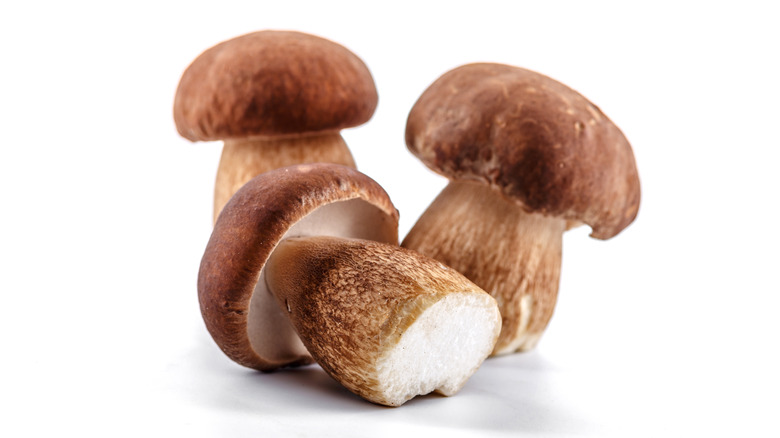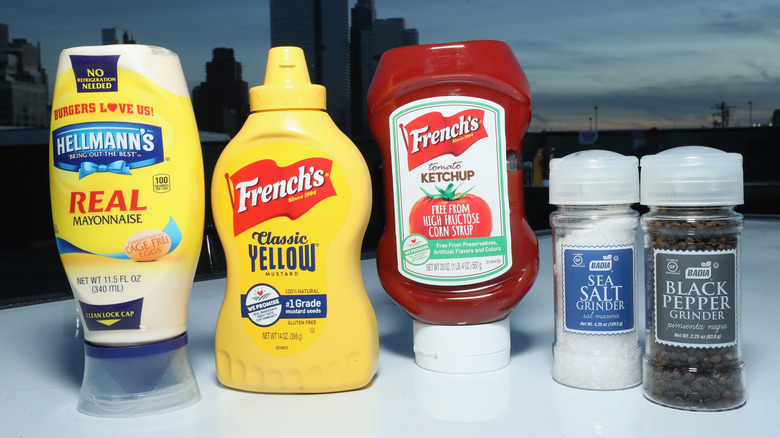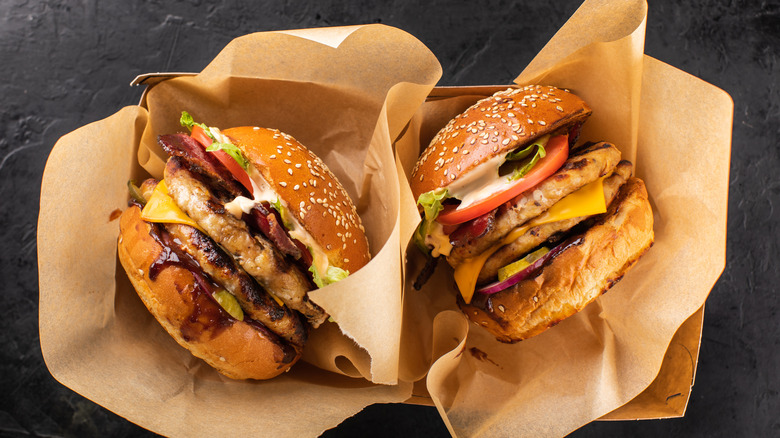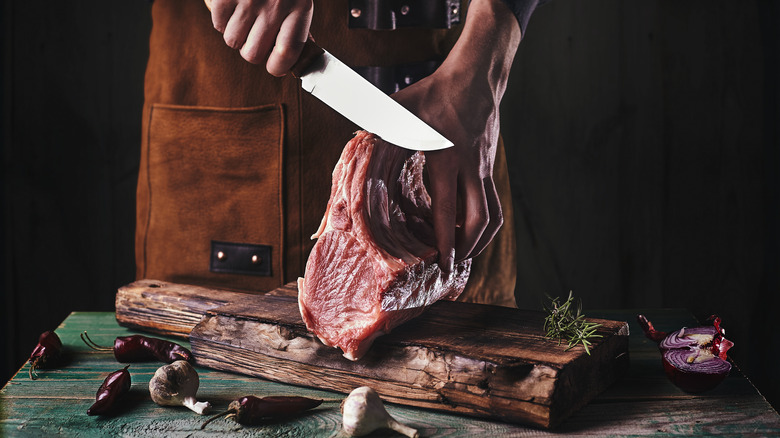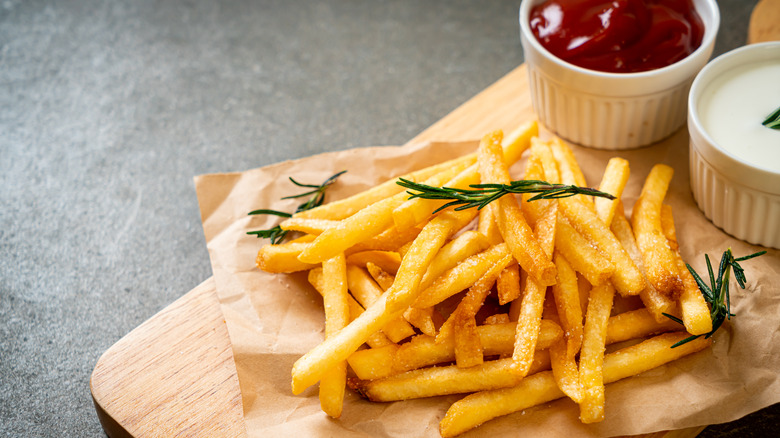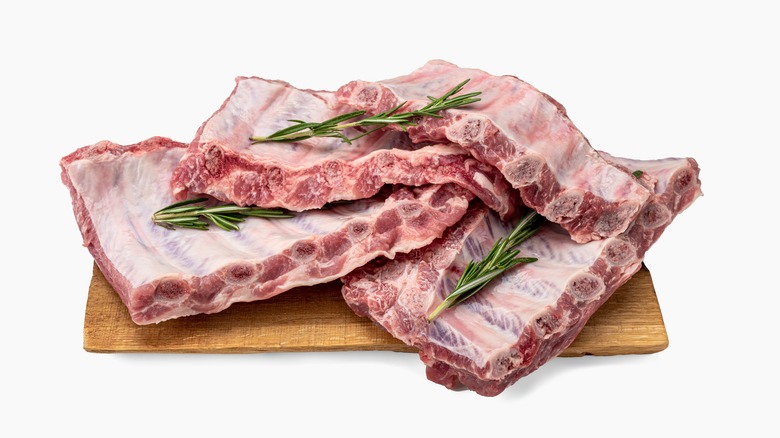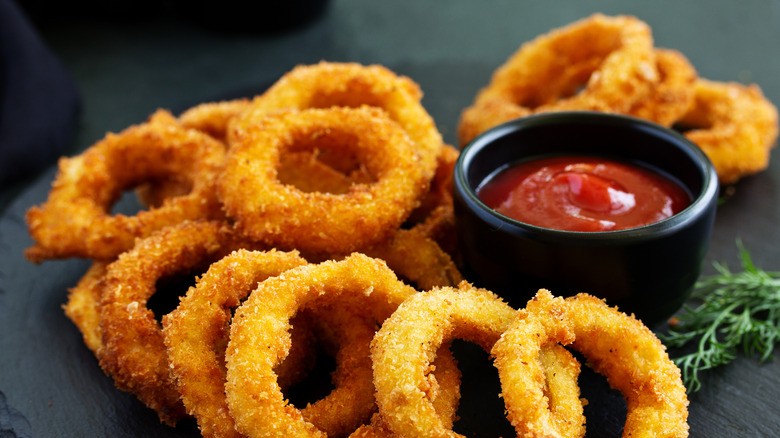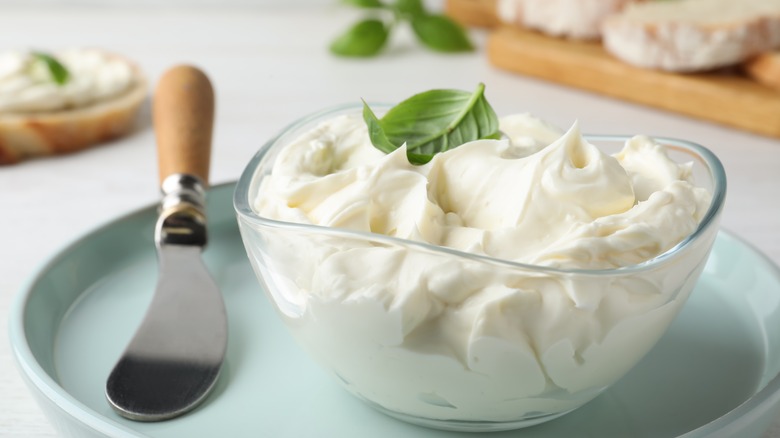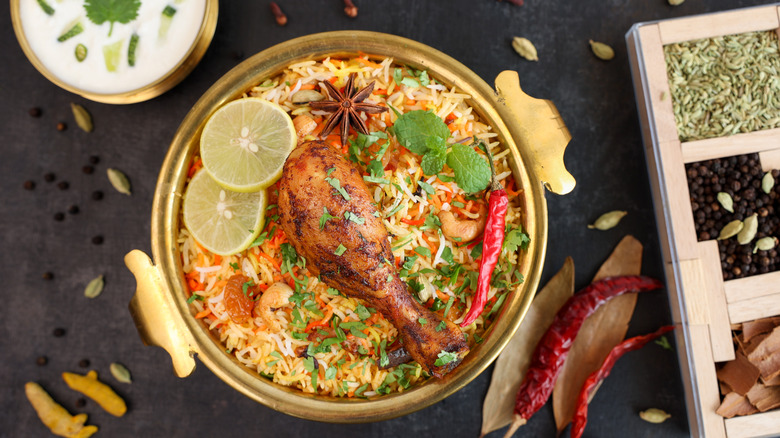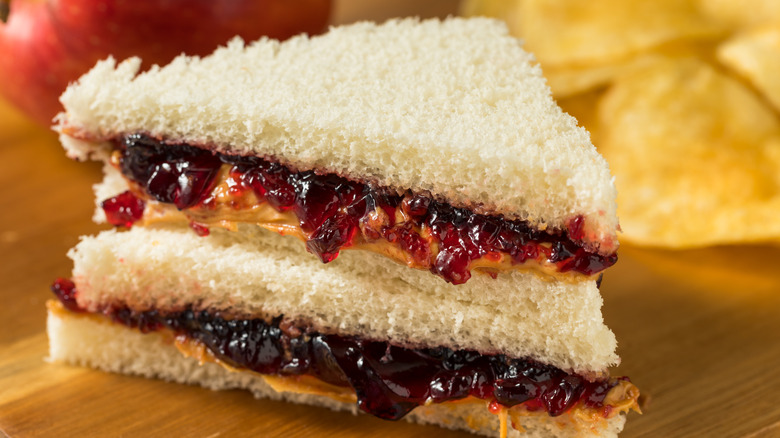Bizarre Food Bans Imposed By Sports Teams
It's surprising but true: When it comes to what their players can consume, coaches give plenty of foods we commonly associate with sports the red card. Some nibbles, like pizza and french fries, make some sense. Others, like mushrooms, are downright puzzling. Across the pond, there have also been massive blanket bans on foods and drinks that Americans almost exclusively link to sports.
Take Gatorade, for example. According to HITC, the European Union cracked down on the jewel-toned athletic beverages in 2012, thanks to brominated vegetable oil (or BVO). Per the Chicago Tribune, the American appetite for BVO and other questionable additives soured, too, after a viral online plea to remove the ingredient forced Gatorade to reexamine its drink contents. The company eventually phased it out altogether. While Gatorade was sent to the penalty box thanks to an EU ban on BVO (via European Parliament), some coaches have taken dietary restrictions into their own hands, with mixed results.
Pizza
According to The Sun, Manchester City coach Pep Guardiola required his whole team to eat meals together family-style so he could keep track of what they were shoveling down. In addition, the famously meticulous coach mandated regular team meals missing some key comfort food elements that most people, athletes or otherwise, crave. The one that made headlines in the U.K. was pizza (via The Guardian).
Man City player Gaël Clichy spoke up about Guardiola's ban in an interview with The Guardian, noting that the pizza rule was a direct response to the players' ever-expanding waistlines. Team members who didn't meet Guardiola's strict fit-and-trim specifications were banned from training sessions. When it came to the battle of the bulge, Guardiola saw pizza pie as a direct enemy. While this is the most notable food banished by Pep Guardiola, several other yummy treats, like juice, also got the boot (via The Guardian).
Ice in drinks
While banning soda might seem to make a lot of sense, banning ice in drinks is a real head-scratcher unless you're Paolo Di Canio. This Sunderland coach warned his players that they must avoid all sorts of strange things, including popular condiments, coffee, and phones (via The Telegraph). He also had an issue with amateur singers, believing that belting out a tune in the communal showers would mess with pre-game concentration. One of his most famous banned substances was a little something we pop into our iced lattes and Coca-Cola daily.
According to The Telegraph, Di Canio wanted to revolutionize the locker room, recreating it in his own image by restricting phone use and bubbly drinks like Coca-Cola. As for the ice cubes, Di Canio asserted that excess ice caused indigestion and messed with gameplay. Although craving ice could be a sign of pica and cause dental problems (via Healthline), sipping cold drinks with ice doesn't seem to be a major no-no — except in Di Canio's locker room.
Monster Munch Chips
Monster Munch chips have a massive following in the United Kingdom, as evidenced by the fan fury that swelled to a fever pitch after the briny, onion-flavored treat didn't make a snack top 10 list (via The Sun). Since this snack doesn't appear to have much of a following outside the U.K., French-born coach Paul Le Guen might not have understood the rage he would tap into when he banned Monster Munch after signing on to coach the West London Rangers, but he soon learned. According to World Soccer, Le Guen's twin bans on ketchup and precious Monster Munch chips went over terribly.
The Scotsman notes that players didn't take too kindly to Le Guen's ban, arguing that a celebratory bag or two of Monster Munch wasn't going to kill their winning prospects. It's hard to say, but as with many of these bans, it all might have come down to backlash over Le Guen's micromanaging, with Monster Munch chips serving as a lightning rod for the team's dissatisfaction.
Chocolate
According to Radio Times, Arsène Wenger's tenure at Arsenal was marked by a healthy overhaul of players' dietary habits, swapping out their calorie-saturated junk food for more nutritious fare. Although Arsenal's players seemed to grin and bear the loss of their fries and burgers in lieu of veggies, there was one thing that Wenger did that definitely crossed the line: his chocolate ban.
Wenger himself notes that the chocolate ban prompted a near-mutiny on the team, with players calling for their favorite Mars bars (via Radio Times). Wenger isn't alone in his hasty chocolate ban. Other coaches like George Graham had similarly stringent rules. The Daily Mail notes that nixing chocolate from players' diets was simply one way to keep their blood sugar steady. On the other hand, it's probably fair to say that Arsenal players perhaps experienced a massive spike in their blood pressure once they learned about it.
Eggs
According to Runtastic, eggs are an incredible food to get your body up and moving, thanks to the myriad nutrients and vitamins. Still, these perfect protein packages get no love in certain locker rooms. For example, Liverpool coach Jürgen Klopp doesn't see eggs as the darling of the sports diet world. In fact, according to 90 Min, carbs are the fuel du jour for game days. The logic is that fat and protein-rich foods like eggs break down slowly, whereas carbs give you instant power, so no eggs are allowed when Liverpool is on the field.
Ironically enough, this same coach got into an entertaining beef with a Twitter egg, or a faceless internet troll adept at picking fights. Paste Magazine notes that Raymond Verheijen took aim at Klopp, saying he "does not have a clue about the principles of periodisation." It's unclear whether or not the coach's questionable locker room diet rules fed the fight.
Condiments
According to Planet Football, Tottenham Hotspurs coach Antonio Conte waged a dietary war on popular condiments, specifically mayo and ketchup. The two sauces got nixed from the field as a way to improve players' fitness, a common trend with food-based bans. But, as with most dietary prohibitions, this one may not have had the desired effect.
Planet Football notes that limiting condiment consumption makes little, if any, difference in the overall scheme of things and can actually add a little zest to otherwise lifeless and unappealing meals. Fortunately, Tottenham players got their zing back thanks to Harry Redknapp, who brought the era of condiments back into action by providing the team with some ketchup (via Talk Sport). We may never know if embracing bland, condiment-free food is the ultimate key to athletic success, but we can make the educated guess that the Spurs rejoiced in having access to their favorite sauces again.
Mushrooms
Mushrooms are certainly one of the strangest food bans on our list, which is why Ireland's coach Giovanni Trapattoni got such puzzled responses to his World Cup fungi ban. According to The Irish Times, Trapattoni showed shrooms the door after he saw his players chowing down on them before hitting the field. The Irish Times speculates that Trapattoni's fungi aversion may have to do with mushroom-related upset stomachs, but team members were quite puzzled by the call.
Even the Commercial Mushroom Producers (CMP) got involved, calling on Trapattoni to educate himself on mushrooms and give them a chance (via Irish Times). Interestingly enough, Healthline cheers on the benefits of mushroom coffee before working out, and most mushrooms are an inherently healthy food. While other sports food bans like pizza and junk food make sense, this one is beyond baffling. Perhaps Trapattoni just has a personal aversion to mushrooms in general?
Salt, pepper, and ketchup
According to Talk Sport, Tottenham coach Juande Ramos had some pretty strict rules about food, including banning players from consuming basic spices like salt and pepper. In the interest of keeping players slim and fit, Ramos' idea of an epic athletic diet involved unseasoned proteins and sauceless noodles, an unappetizing concept at best. It only gets worse when you consider that salt was entirely off the dining table.
Not only did Ramos ban basic seasonings, but he also denied Tottenham some of the players' favorite sauces, including ketchup. He banned junk food of any kind, punishing players for the crimes of sneaking some McDonald's to satisfy their cravings (via Talk Sport). Between the flavorless carbs, steamed veggies, and dry proteins, Tottenham players were hungry for change — and happy when a new coach let them have their favorite goodies. We're willing to bet that they never take essential seasonings for granted again.
Chicken burgers
Before Claudio Ranieri's reign with the Leicester Foxes, team members loved indulging in chicken burgers after matches, but the new coach squashed that tradition (via Sports Mole). After a losing streak, the Foxes' chicken burger privileges were revoked, and their tasty chicken burgers got substituted for something less appealing: pasta.
Although chicken burgers are certainly not the healthiest food on the planet, the Foxes didn't like a coach messing with their ritual. According to The Mirror, denying players their post-game chicken burgers was just one of Ranieri's many changes when signing on to the team. The lesson here might be that you don't mess with tradition. According to Muscle and Fitness, chicken burgers can be reasonably healthy if you prepare them properly. Perhaps a better move would have been for Ranieri to keep the burger tradition while adding a few vegetables on the side to even things out.
Meat
Carnivorous Chinese athletes craving meaty treats were out of luck in the 2012 London Olympics when their home country banned meat from the competition. According to The Telegraph, fear in the Chinese General Administration of Sport stemmed from clenbuterol contamination — a prohibited substance that could compromise the athletes' eligibility in the games. Reuters notes that while the meatless meals were deemed necessary, there was some concern amongst coaches that depriving participants of meat could lead to worse performances.
According to Reuters, all-veggie diets are convenient scapegoats for Chinese coaches, with the country's volleyball team attributing a string of defeats to their meatless fare. Unfortunately, there was nothing that on-the-ground coaches could do except grin, bear it, and serve up some hearty veggies. The Chinese Sports Ministry ban left athletes to make do without pork, lamb, or beef throughout their tenure in the 2012 games (via Reuters).
French fries
In a bid to get Manchester United players field-ready, David Moyes aimed at a typical fast food treat: french fries. Known as chips across the pond, consuming these high-carb, sodium-laden treats may put players at risk of packing on extra pounds, but eating a couple of fries might not be so terrible (via Harvard). Still, Moyes nixed the fries and squashed many of the players' pre-game indulgences, much to their dismay (via The Guardian).
According to The Guardian, players like Rio Ferdinand called out Moyes for his stringent dietary rules, as well as his particular training exercises. In Four Four Two Magazine, Moyes defended his war on salty, greasy, delicious chips by citing the players' waistlines and calling for healthier snacking. While french fry bans might seem logical or even wise on the surface, if there's anything we've learned from professional athletes, it's that depriving them of their favorite pre- or post-game rituals will never win coaches a popularity award.
Non-halal meat
The Indian men's cricket team made some waves when it vetoed all non-halal meat for its players. According to India Today, the dietary decision was not handed down from the Board of Control for Cricket in India but came straight from management. Under the rules, the team could not consume any beef or pork, and what meat they did ingest had to be fully halal.
According to the BBC, halal refers to meat or other foods prepared according to the Koran's customs and laws. These laws specify how animals are to be killed for human consumption and involve a specific process where all of the blood is drained from the animal. Non-halal foods are strictly forbidden in Islamic tradition, and all foods must be certified as halal to make them safe to eat (via Halal RC). While other bans on our list are specifically designed to help players lose weight, this one seems to be a sign of respect for the Indian cricket team's Muslim players.
Fatty foods and snacks
Baseball and fatty foods may seem to go well together, but this marriage made in ballpark bliss doesn't work so well for the players. Instead, according to NPR, plenty of teams are ditching the Fenway franks and substituting in more calorie-conscious and healthier alternatives, with nutritionists on board to help guide the way. From the Red Sox "Fenway farm" (via Christian Science Monitor), to poke bowls in L.A. and grain salads in Philly (via Nutritious Life), spectators and players alike are getting a makeover of healthier options (via CBS News).
While only time will tell whether or not baseball's healthy lean will be a home run with players and spectators, the sport has made conscientious switches before. It wasn't that long ago that chewing tobacco was as synonymous with baseball as loaded hot dogs and towering pints of beer are today (via BBC). It's certainly a step in the right direction for America's favorite pastime.
Cream cheese
The NCAA used to have some convoluted rules revolving around what its athletes could eat, including one affectionately known as the "cream cheese rule," specifying that bagels and other snacks were okay, but cream cheese was a big no-no. This widely derided rule applied to full-scholarship students in particular, lumping in cream cheese with a host of other toppings that the NCAA decreed could not adorn bone-dry bagels, the logic being that a bagel was a "snack," but a bagel with toppings was a "meal."
Fortunately, the cream cheese rule is no longer in effect. According to CBS Sports, athletes can eat virtually anything they want. That doesn't keep the cream cheese rule from popping up in all corners of the internet, including Reddit, where the lore lives on that popping a smear of cream cheese on your bagel will transform it into something wholly different and prohibited.
Biryani
While most of the foods on our list are blanket bans on popular snacks or fried goodies, the coach of Pakistan's cricket team had a different and particular target for his ban: biryani. According to the India Times, Misbah-ul-Haq determined that the flavorful, fatty, meaty dish was a no-go. The Hindustan Times notes that Misbah-ul-Haq's team, the Green Brigade, was routinely mocked for being "unfit," sparking his desire to eradicate unhealthy foods from the menu and scrap regional faves like biryani.
Additionally, he banned junk food — especially before matches — and helped his team get on the path to better health. So if you're not playing for the Green Brigade or under the watchful eye of coach Misbah-ul-Haq, you can make a fantastic biryani with Basmati rice at home. There's one caveat, though; the likelihood of you doing anything but slipping into a cozy food coma after eating it is nil.
Peanut butter and jelly
The Golden State Warriors coach Lachlan Penfold sparked a furious controversy when he banned his star players from eating one of their childhood faves (via ABC7 News). While the Warriors won their right to consume all the sandwiches they wanted, eventually, this still goes down in sports history as one of the most contentious bans ever. Per The Comeback, peanut butter and jelly sandwiches were just one of the many foods the NBA team banned, but they were almost certainly the ones that hit players right in the heart.
The Warriors embarked on a mission to get their PB&J back, with the interim coach stepping in to rally for the players (via The Comeback). Clearly, there are just some things that you leave well enough alone. So if you're not banned from eating PB&J to your heart's delight, check out these secrets to making the perfect peanut butter and jelly sandwich.
